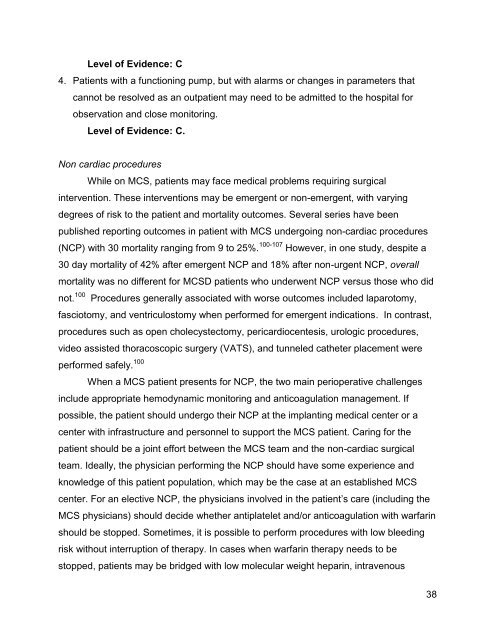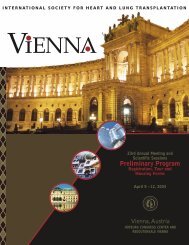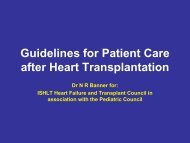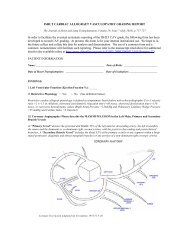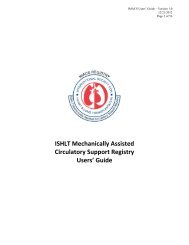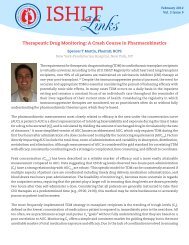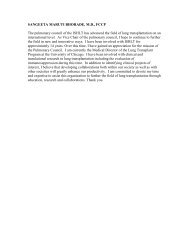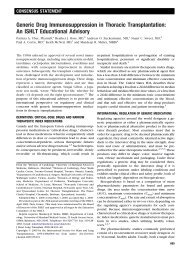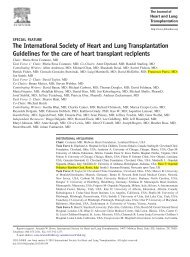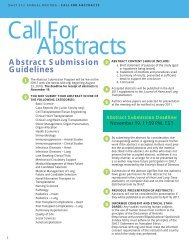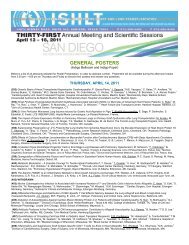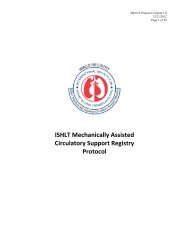Task Force 4: Inpatient Management of Patients with MCSD - The ...
Task Force 4: Inpatient Management of Patients with MCSD - The ...
Task Force 4: Inpatient Management of Patients with MCSD - The ...
Create successful ePaper yourself
Turn your PDF publications into a flip-book with our unique Google optimized e-Paper software.
Level <strong>of</strong> Evidence: C<br />
4. <strong>Patients</strong> <strong>with</strong> a functioning pump, but <strong>with</strong> alarms or changes in parameters that<br />
cannot be resolved as an outpatient may need to be admitted to the hospital for<br />
observation and close monitoring.<br />
Level <strong>of</strong> Evidence: C.<br />
Non cardiac procedures<br />
While on MCS, patients may face medical problems requiring surgical<br />
intervention. <strong>The</strong>se interventions may be emergent or non-emergent, <strong>with</strong> varying<br />
degrees <strong>of</strong> risk to the patient and mortality outcomes. Several series have been<br />
published reporting outcomes in patient <strong>with</strong> MCS undergoing non-cardiac procedures<br />
(NCP) <strong>with</strong> 30 mortality ranging from 9 to 25%. 100-107 However, in one study, despite a<br />
30 day mortality <strong>of</strong> 42% after emergent NCP and 18% after non-urgent NCP, overall<br />
mortality was no different for <strong>MCSD</strong> patients who underwent NCP versus those who did<br />
not. 100 Procedures generally associated <strong>with</strong> worse outcomes included laparotomy,<br />
fasciotomy, and ventriculostomy when performed for emergent indications. In contrast,<br />
procedures such as open cholecystectomy, pericardiocentesis, urologic procedures,<br />
video assisted thoracoscopic surgery (VATS), and tunneled catheter placement were<br />
performed safely. 100<br />
When a MCS patient presents for NCP, the two main perioperative challenges<br />
include appropriate hemodynamic monitoring and anticoagulation management. If<br />
possible, the patient should undergo their NCP at the implanting medical center or a<br />
center <strong>with</strong> infrastructure and personnel to support the MCS patient. Caring for the<br />
patient should be a joint effort between the MCS team and the non-cardiac surgical<br />
team. Ideally, the physician performing the NCP should have some experience and<br />
knowledge <strong>of</strong> this patient population, which may be the case at an established MCS<br />
center. For an elective NCP, the physicians involved in the patient’s care (including the<br />
MCS physicians) should decide whether antiplatelet and/or anticoagulation <strong>with</strong> warfarin<br />
should be stopped. Sometimes, it is possible to perform procedures <strong>with</strong> low bleeding<br />
risk <strong>with</strong>out interruption <strong>of</strong> therapy. In cases when warfarin therapy needs to be<br />
stopped, patients may be bridged <strong>with</strong> low molecular weight heparin, intravenous<br />
38


